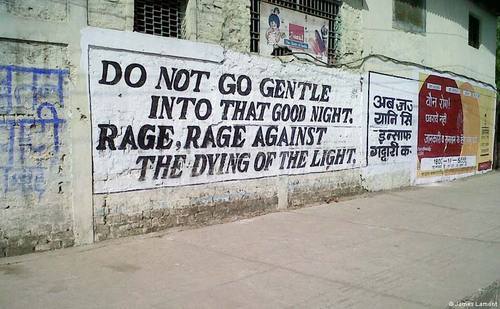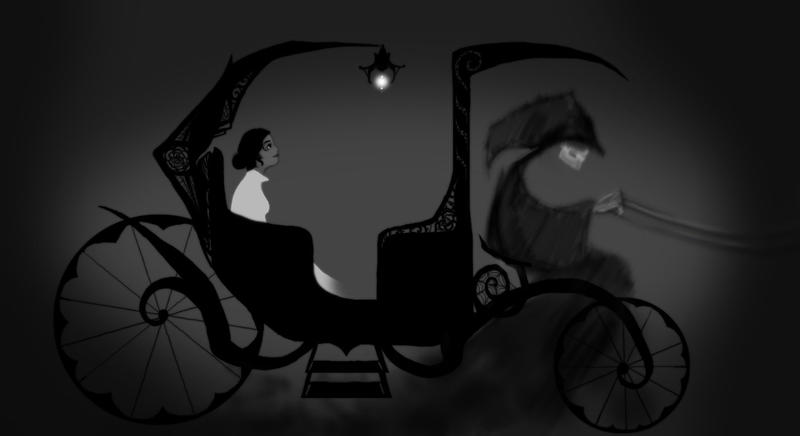Reading 2: Monologues
My Mother’s Eggplant
by Vijaya Bodach
I believe in eggplant. My mother’s eggplant.
Although I’d been fixing eggplant for many years, I didn’t stumble across my mother’s eggplant until my husband bought a ceramic barbecue. One evening, I handed over a shiny, purple eggplant for him to roast over the coals.
After the eggplant cooled off, I peeled the blackened skin, then mashed the pulp. I fried onions, garlic, chili peppers, turmeric, and cumin seeds. My big fancy kitchen took on the aroma of the tiny kitchen I had known as a child in India. I added the mashed eggplant along with finely chopped tomatoes and cilantro. At the very end, I added a dollop of creamy yogurt. It wasn’t until supper, when I finally had a bite of the eggplant with my rice, that I started crying.
“What’s the matter?” asked my husband. My small children looked worried.
“It’s my mother’s eggplant,” I stuttered, tears streaming down my face. “It’s my mother’s eggplant.”
“Really?” asked my four-year-old son.
I nodded my head. “She would love it if she were here with us today,” I sobbed.
I missed my mother so much. She had died over twenty years ago, but at that moment I was missing her as though she’d only just left this world. I wished she were at our kitchen table, telling us family stories, enjoying the food that I had prepared.
I imagine my grown children might one day bring home a shiny eggplant, roast it over hot coals, and carefully season it. They’ll remember to add a dollop of yogurt just before serving. And I believe they’ll remember me, my mother, and my mother’s eggplant.
From The Future of Food
by Alice Waters:
http://www.wsj.com/articles/alice-waters-says-the-future-of-food-is-sustainable-and-locally-sourced-1404763421
Over the past half-century, the fast-food industry, aided by government subsidies, has come to dominate the food marketplace. That development has given us an obesity epidemic and, with the growth of so-called factory farms, has degraded the environment.
More recently, in a reaction against fast food and Big Ag, the sustainable-food movement, with a focus on local food networks and healthy eating, has gained a foothold in restaurants and farms across the country. What began as an underground movement has now gone mainstream.
Looking forward, I believe that ever-growing numbers of Americans—led by passionate chefs, farmers and activists—will choose the latter of these two paths: a sustainable food future. I know that those on both sides of the political aisle finally realize that in food we find the root problem of many of our nation's ills. I am not sure yet that they realize that food has the solution.
From Interview
with Alice Waters
You know, when I opened my restaurant Chez Panisse 42 years ago, I wasn’t really looking for a marketplace. I was looking for taste.
And — and it was that sort of search for something that really tasted like the food I had eaten in France, I ended up at the doorsteps of the organic local farmers and producers.
Why do I believe organic food, locally grown food, especially organic, is so important for people? Well, first and foremost is that the organic growers are taking care of the land. And that’s where our food comes from.
So, we want the farmers to be supported who really care about not only our nourishment, but the nourishment of the land. And I think that’s — that’s really what it’s about. It’s reconnecting with people who are those stewards and those caretakers.
But I have also found that they plant all kinds of fruits and vegetables now that have more flavor. So, I’m looking for the vegetables and fruits particularly that are the varietals, that have this kind of gastronomic importance.
I always say that if you go to the farmers market on a weekend, and you buy really delicious-tasting fruits and vegetables, and other things as well-- a nice organic chicken, you can very easily cook during the week, because you have ingredients that have taste.
Like, in the summer, you’re just slicing that tomato, and it’s so effortless. You’re cooking a little piece of fish. It’s difficult to cook when you don’t have those ingredients. And it’s — it’s beautiful to take a whole chicken and roast it in the oven, and maybe keep those bones, make a soup at the end of a meal, and then have another dinner the next night that incorporates that stock that you have made.
From The Fate of our Nation Rests on School Lunches
by Alice Waters
http://time.com/2885124/alice-waters-the-fate-of-our-nation-rests-on-school-lunches/
It was the French philosopher Brillat-Savarin who wrote, “The destiny of nations depends on how they nourish themselves.” And it is this idea that is never far from my mind when it comes to the discussion of school lunch in this country.
Right now we all need to pause, step back and look at the bigger picture. The costs associated with not investing in real food are too great, and we need to acknowledge honestly the far-reaching consequences that the current program has had in every area of American life. By allowing fast-food culture into the cafeteria, we have effectively endorsed that industry’s values, helped facilitate the obesity epidemic, widened the achievement gap and aided an addiction to junk. Even in the short term these costs, both tangible and intangible, dwarf the budget for a universal — and real — school food program. The idea of school lunch as an egalitarian mechanism to nourish our nation’s potential has long been discarded and devalued. We are faced with an enormous crisis of health, education and inequality.
We need to have the courage and conviction to establish a nutritious, sustainable, free school-lunch program for all.
Micheal Pollan: Out of the Kitchen, Onto the Couch
http://www.nytimes.com/2009/08/02/magazine/02cooking-t.html?_r=2&
I was only 8 when “The French Chef” first appeared on American television in 1963, but it didn’t take long for me to realize that this Julia Child had improved the quality of life around our house. My mother began cooking dishes she’d watched Julia cook on TV: boeuf bourguignon (the subject of the show’s first episode), French onion soup gratinée, duck à l’orange, coq au vin, mousse au chocolat. Some of the more ambitious dishes, like the duck or the mousse, were pointed toward weekend company, but my mother would usually test these out on me and my sisters earlier in the week, and a few of the others — including the boeuf bourguignon, which I especially loved — actually made it into heavy weeknight rotation. So whenever people talk about how Julia Child upgraded the culture of food in America, I nod appreciatively. I owe her. Not that I didn’t also owe Swanson, because we also ate TV dinners, and those were pretty good, too.
Every so often I would watch “The French Chef” with my mother in the den. On WNET in New York, it came on late in the afternoon, after school, and because we had only one television back then, if Mom wanted to watch her program, you watched it, too. The show felt less like TV than like hanging around the kitchen, which is to say, not terribly exciting to a kid (except when Child dropped something on the floor, which my mother promised would happen if we stuck around long enough) but comforting in its familiarity: the clanking of pots and pans, the squeal of an oven door in need of WD-40, all the kitchen-chemistry-set spectacles of transformation. While Julia waited for the butter foam to subside in the sauté pan, you waited, too, precisely as long, listening to Julia’s improvised patter over the hiss of her pan, as she filled the desultory minutes with kitchen tips and lore. It all felt more like life than TV.
Be Cool to the Pizza Dude
by Sarah Adams
http://thisibelieve.org/essay/23/
If I have one operating philosophy about life it is this: “Be cool to the pizza delivery dude; it’s good luck.” Four principles guide the pizza dude philosophy.
Principle 1: Coolness to the pizza delivery dude is a practice in humility and forgiveness. I let him cut me off in traffic, let him safely hit the exit ramp from the left lane, let him forget to use his blinker. His pizza light atop his car glowing like a beacon reminds me to check myself as I flow through the world. After all, the dude is delivering pizza to young and old, families and singletons, gays and straights, blacks, whites and browns, rich and poor, vegetarians and meat lovers alike. As he journeys, I give safe passage, practice restraint, show courtesy, and contain my anger.
Principle 2: Coolness to the pizza delivery dude is a practice in empathy. Let’s face it: We’ve all taken jobs just to have a job because some money is better than none. In the big pizza wheel of life, sometimes you’re the hot bubbly cheese and sometimes you’re the burnt crust. It’s good to remember the fickle spinning of that wheel.
Principle 3: Coolness to the pizza delivery dude is a practice in honor and it reminds me to honor honest work. Let me tell you something about these dudes. They never took over a company and laid off 20,000 people. Rather, the dudes sleep the sleep of the just.
Principle 4: Coolness to the pizza delivery dude is a practice in equality. My measurement as a human being, my worth, is the pride I take in performing my job — any job — and the respect with which I treat others. I am the equal of the world not because of the car I drive, the size of the TV I own, the weight I can bench press, or the calculus equations I can solve. I am the equal to all I meet because of the kindness in my heart. And it all starts here — with the pizza delivery dude.
The Grilled Cheese Principle
by Emily Shmitt Lavin
http://thisibelieve.org/essay/121218/
I have a memory of being about five years old, picking up a beautiful grilled cheese sandwich made for me by my hard-working mother and turning it over to see that the other side was burned. Suddenly, what I thought was the perfect sandwich was not so perfect. Mom had tried (unsuccessfully) to hide that fact from me. There was no question; I ate it anyway without complaining. However, that moment (actually several moments, as that situation repeated often throughout my childhood) has stuck in my mind for many years. Now, at the age of 43 as a mother of two children and as a biology professor where I am routinely the “academic mother” of hundreds of students every year, I find that I believe in The Grilled Cheese Principle. Here is what I mean.
Making a grilled cheese sandwich is easy, right? But when I think of how many burned grilled cheese sandwiches I have eaten, or I have made myself, I realize that most of the grilled cheese sandwiches I have known have had at least one burned side. The thing is, that although it is a relatively easy thing to make I can also easily lose focus, and before long the sandwich is burned. For my mother, the first side was usually perfect and the second side got burned due to her being distracted. For me, I have tended to burn the first side, but then I more carefully monitor the second side. Either way, the grilled cheese sandwich suffers because it has not been given the attention it deserves.
So, I have learned that even the most tedious and simple task deserves my full attention. When I am multitasking, I am doing none of the tasks well. And when I allow myself to be distracted, I am not in the present moment—not paying attention to the small details of living or enjoying the process.
When I avoid being rushed and take pride in the simple steps, I believe whether in personal or professional matters, I will achieve uncommon and appreciated perfection.
There is No Such Thing as Too Much Barbecue
by Jason Sheehan
http://thisibelieve.org/essay/5322/
I believe in barbecue. As soul food and comfort food and health food, as a cuisine of both solace and celebration. When I’m feeling good, I want barbecue. And when I’m feeling bad, I just want barbecue more. I believe in barbecue in all its regional derivations, in its ethnic translations, in forms that range from white-tablecloth presentations of cunningly sauced costillas, to Chinese take-out spareribs that stain your fingers red, to the most authentic product of the tar-paper rib shacks of the Deep South. I believe that no day is bad that has barbecue in it.
I believe that proper barbecue ought to come in significant portions. Skinny people can eat barbecue, and do, but the kitchen should cook for a fat man who hasn’t eaten since breakfast. My leftovers should last for days.
I believe that if you don’t get sauce under your nails when you’re eating, you’re doing it wrong. I believe that if you don’t ruin your shirt, you’re not trying hard enough.
I believe – I know – there is no such thing as too much barbecue. Good, bad or in-between, old-fashioned pit-smoked or high-tech and modern; it doesn’t matter. Existing without gimmickry, without the infernal swindles and capering of so much of contemporary cuisine, barbecue is truth; it is history and home, and the only thing I don’t believe is that I’ll ever get enough.











